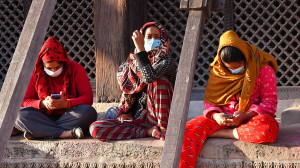Health
Fungal diseases may wipe out banana in a decade
Banana could well be wiped out globally in just five to 10 years by fast-advancing fungal diseases, warn researchers.
Ians
Banana could well be wiped out globally in just five to 10 years by fast-advancing fungal diseases, warn researchers.
The threat could be coming from something called the Sigatoka complex, made up from three fungal diseases, which pose a huge risk to the world's banana supply.
Researchers at the University of California - Davis in the US and in the Netherlands discovered how this group of three closely related fungal pathogens evolved into a lethal threat to the world's bananas.
The banana is the world's leading fruit crop and ranks fourth as a global staple food. Almost 140 million tonnes of the fruit are produced across the world every year. At almost 25 million tonnes annually, India leads among the 10 major producers globally.
Bananas, however, are prone to many diseases that can severely reduce production, posing a threat to global food security.
The fruit also suffers from an "image problem," giving consumers the appearance that it is and always will be readily available, said one of the researchers, Ioannis Stergiopoulos from the University of California - Davis.
Already, the Sigatoka disease complex can reduce banana yields by 50-70 per cent, if not controlled.
The Sigatoka disease complex is a cluster of three closely related fungi — yellow sigatoka (Pseudocercospora musae), eumusae leaf spot (Pseudocercospora eumusae) and black sigatoka (Pseudocercospora fijiensis) — which emerged in quick succession during the last century as destructive pathogens on banana.
Yellow sigatoka was the first of the three to be recorded on banana, although eumusae leaf spot and black sigatoka are now the most devastating. Black sigatoka, in fact, is posing the greatest constraint to banana production worldwide, the study said.
Black sigatoka is air-borne and affects the leaves of banana plants in small and large-scale plantations, and without chemical control it results in huge yield losses.
The disease also reduces the quality of the fruit, causing premature ripening.
"Now, for the first time, we understand the genomic basis of the evolution of virulence in these fungal diseases, thus giving us an opportunity for intervention," Stergiopoulos said.
Another study led by scientists from Wageningen University and Research Centre in the Netherlands unravelled the DNA of the fungus that causes black Sigatoka disease in bananas.
Both the studies, published in the journal PLOS Genetics, provide leads for increasing the sustainability of banana cultivation, for instance through the development of a resistant banana plant.




 9.12°C Kathmandu
9.12°C Kathmandu











%20(1).jpg&w=300&height=200)

